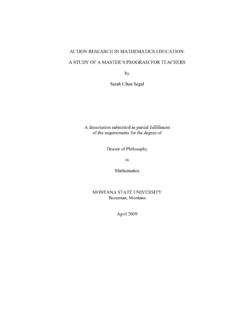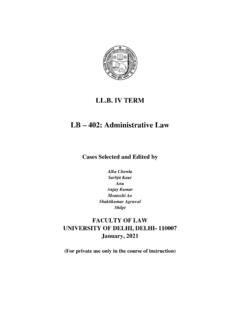Transcription of IMPORTANCE OF FINANCIAL LITERACY AND FINANCIAL …
1 IMPORTANCE OF FINANCIAL LITERACY AND FINANCIAL LITERACY CONTENT IN CURRICULUM by Candice Arrington Tschache A thesis submitted in partial fulfillment of the requirements for a degree of Masters of Education in Education MONTANA STATE UNIVERSITY Bozeman, Montana July 2009 COPYRIGHT by Candice Arrington Tschache 2009 All Rights Reserved ii APPROVAL of a thesis submitted by Candice Arrington Tschache This thesis has been read by each member of the thesis committee and has been found to be satisfactory regarding content, English usage, format, citation, bibliographic style, and consistency, and is ready for submission to the Division of Graduate Education Dr.
2 Joyce Herbert Approved for the Education Department Dr. Robert Carson Approved for the Division of Education Dr. Carl A. Fox iii STATEMENT OF PERMISSION TO USE In presenting this thesis in partial fulfillment of the requirements for a master s degree at Montana State University, I agree that the Library shall make it available to borrowers under the rules of the Library. If I have indicated my indication to copyright this thesis by including a copyright notice page, copying is allowable only for scholarly purposes, consistent with fair use as prescribed in the Copyright Law. Requests for permission for extended quotation from or reproduction of this thesis in whole or in parts may be granted only by the copyright holder.
3 Candice Arrington Tschache July 2009 iv ACKNOWLEDGEMENTS I would like to acknowledge my family and my husband for their patience in bearing with me while I typed notes into the night and missed out on some of the family time and memories. Thanks for your love and forgiveness. I would also like to thank Dr. Jayne Downey for her help and encouragement. It was when I was feeling the stress of completing my masters that she encouraged me the most and helped me realize that I could do it. I would also like to thank Dr. Debby Haynes for all her words of encouragement and her patience when it took me so long to complete my masters. She was a rock and never once gave up on me.
4 Also I would like to thank Dr. Lynn Kelting-Gibson for her unfailing dedication to getting me through this. Her cheerfulness and support provided me with the confidence to get my masters done. v TABLE OF CONTENTS 1. Problem Purpose Research Significance of the 2. REVIEW OF State National History of FINANCIAL 1700s 1900s Cooperative Extension 1950s 2000 FINANCIAL College 3. Data Collection 4. DATA ANALYSIS AND Data Interpretations: Discussion of Part I of Interpretations: Discussion of Part II of Survey ..39 vi TABLE OF CONTENTS CONTINUED 5. FINDINGS AND Discussion and Interpretation of Recommendation for Future APPENDIX A: FINANCIAL LITERACY APPENDIX B: FINANCIAL LITERACY Results Part APPENDIX C: FINANCIAL LITERACY Results Part vii LIST OF TABLES Table Page 1.
5 Summary of statement #1 results .. 25 2. Summary of statement #2 results .. 26 3. Summary of statement #3 results.. 27 4. Summary of statement #4 results .. 28 5. Summary of statement #5 results.. 29 6. Summary of statement #6 results .. 30 7. Summary of statement #7 results .. 31 8. Summary of statement #8 results .. 32 9. Summary of statement #9 results .. 33 10. Summary of statement #10 results ..34 11. Summary of statement #11 results .. 35 12. Summary of statement #12 results .. 36 13. Summary of statement #13 results .. 37 14. Summary of statement #14 results .. 38 15. Summary of FINANCIAL concept checkbook balancing results.
6 40 16. Summary of FINANCIAL concept personal budgeting results .. 41 viii ABSTRACT Teachers, administrators, parents, business owners, and community members need to know the IMPORTANCE and value of a Personal Finance class. In this study, a two page survey was given to teachers, administrators, parents, business owners, and community members to determine the IMPORTANCE they placed on FINANCIAL LITERACY curriculum and what content they think should be included in a FINANCIAL LITERACY curriculum at Bozeman High School. The results of this survey showed that most participants of the survey thought FINANCIAL LITERACY was important and that FINANCIAL LITERACY curriculum was also important.
7 The conclusions of this study were that FINANCIAL education is beneficial and that the concepts taught in that type of curriculum were valued. 1 INTRODUCTION Background FINANCIAL LITERACY is more important than ever in today s world. Being aware of money management, income, saving, and spending can equip our young people with knowledge to fight fraud and take charge of their finances. We are living in an age of unprecedented debt and students are destined to face challenging times financially. It is imperative that educators begin to equip students with the knowledge and skills to succeed as consumers in today s global economy. It was suggested in an article in the Chronicle of Higher Education that the U.
8 S. Secretary of Education s Commission on the Future of Higher Education recommends a promotion of lifelong learning for students so that they are prepared for their entrance into a global economy (Field, 2006). In fact, in a more recent article in NEA Today, a retired teacher Allen Cox supports requiring high school students to complete a FINANCIAL LITERACY course which includes saving, investing, and spending money (NEA Today, 2009). In today s economy, consumers are faced with many consumer and business decisions. Education for these decisions relies on the individual as well as the family s desire to use money effectively as a resource. Money can and often does lead to fulfillment and happiness, but sometimes it is mismanaged.
9 In this context, it is not a business. It is important to understand that managing a family s or a person s finances is not the same as managing a business s finances. Businesses maximize profits; they have to, or they will not stay in business. Families, on the other hand, maximize the individual member s utility. That is, 2 families want their family members to be happy and they use money as a resource toward making their members happy. Most often this means that families do not even save or invest to the level that FINANCIAL experts suggest. If the family was maximizing profits, they would live on as little as possible for health purposes and then save and invest the rest.
10 Money, for families, is a tool for living, not an end (Deborah Haynes, personal communication, July 10, 2009). Individuals and families of today are ready for FINANCIAL education and a FINANCIAL foundation that can be laid down in the context of a Family and Consumer Sciences curriculum. Students are ready for education in the realm of healthy individual and family living which includes help for the monetary hardships of consumer issues. Content High school teachers have been mandated in several states to provide students with education and skills on topics related to money management decisions. The lack of attention to FINANCIAL LITERACY in public high schools has an impact on our prospective consumers in the area of sound FINANCIAL decisions.




